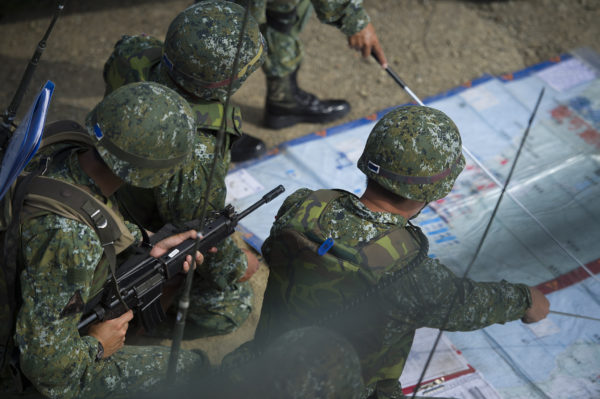ANALYSIS – China's growing inroads among small, former U.S. island allies in the Pacific is concerning. The U.S. has cautioned Pacific nations against assistance from Chinese security forces after reports that police from Beijing are working in the remote atoll nation of Kiribati.
Kiribati is a nation of 115,000 people whose nearest island to the U.S. is 1,340 miles south of Honolulu, Hawaii, the home of the U.S. Indo-Pacific Command. The latest news comes as Beijing renews a push to expand security ties in the Pacific Islands in an intensifying rivalry with the United States. (RELATED: China Makes Move Toward Guam (And Taiwan) – Sends Aircraft Carrier)
Kiribati is considered strategic not only given its relative proximity to Hawaii but because it has one of the world's biggest exclusive economic zones, with 32 atolls spread across more than 1.35 million square miles of the Pacific.
Its current leader, the pro-China Taneti Maamau, has been president since 2016. In the years since his first election, Kiribati has received millions of dollars from Beijing for “livelihood projects.”
The site of a mothballed Chinese space tracking station, Kiribati dumped its allegiance with Taiwan for China in 2019. (RELATED: Guam Elects Its First Republican Since 1993)

The Pentagon has raised concerns that Kiribati might allow China to build dual-use military and civilian facilities on its largest island.
The island nation currently hosts a Japanese satellite tracking station and China has announced plans to rebuild a World War Two U.S. military airstrip on Kiribati's Kanton Island, prompting added U.S. concern.
The U.S. has countered with a pledge in October to upgrade the wharf on Kanton island, a former U.S. military base, and said it wants to open an embassy in Kiribati.
Of note, according to the South China Morning Post:
Climate scientists have long argued that Kiribati will cease to exist in the next 80 years as sea levels rise. Former leader Anote Tong pursued an idea of “migration with dignity” – buying land in nearby Fiji and starting the process of relocating people.
But Mamaau, rejected the migration strategy and instead announced that his government's intention was to “put aside the misleading and pessimistic scenario of a sinking, deserted nation” by pursuing regional support to raise the islands above rising sea levels.
In a video pitch to wealthy investors in 2017, Maamau said he wants to “transform Kiribati into the Dubai or Singapore of the Pacific” by building 5-star eco-resorts that will enable tourists to access “world-class diving, fishing and surfing experiences.”
Alexandre Dayant, a research fellow at Australia's Lowy Institute stated back in 2020:
My understanding is that a project like this would cost anywhere between US$100 million and US$300 million, almost twice Kiribati's GDP. Loans are clearly not an option – Kiribati is considered as being in a high risk of debt distress according to the International Monetary Fund.
This is where Chinese funding comes into play. It also has raised concerns that Kiribati could be subjected to the kind of “debt-trap diplomacy” China has employed elsewhere. Repaying any debt likely involves China building a far bigger security presence on Kiribati.
And it wouldn't be the first.
Voice of America (VOA) reports:
In recent years, Beijing has increasingly positioned itself as the public safety partner of choice for Pacific nations experiencing instability. In January, Papua New Guinea requested Chinese police assistance after riots killed 15 people.
In 2022, the Solomon Islands entered into a security pact with Beijing, and a year later, Prime Minister Manasseh Sogavare signed a police cooperation deal with China for two years. Both Kiribati and the Solomons switched diplomatic ties from Taiwan to Beijing in 2019.
[Still,] others in the region are re-examining their police agreements with China. In January 2023, after 12 years of cooperation with Beijing on policing, Fiji's newly elected prime minister… fired the country's police commissioner and promised to end a police training agreement that allowed Chinese police officers to be stationed in Fiji.
This is why “many in [the U.S.] Congress are questioning why their fellow lawmakers still haven't passed a funding package for three Pacific allies that are also facing economic pressure from Beijing.”
The agreement, known as the Compacts of Free Association or COFA, provides $7 billion in economic aid over 20 years to Palau, Micronesia and the Marshall Islands. It was signed last year, but the funding was dropped in the Senate under pressure from conservatives who wanted to lower spending.
Maybe this is one place Congress shouldn't be stingy, because China is itching to fill the void.
The opinions expressed in this article are those of the author and do not necessarily reflect the positions of American Liberty News.
READ NEXT: Prominent Republican Announces Candidacy To Replace McConnell


